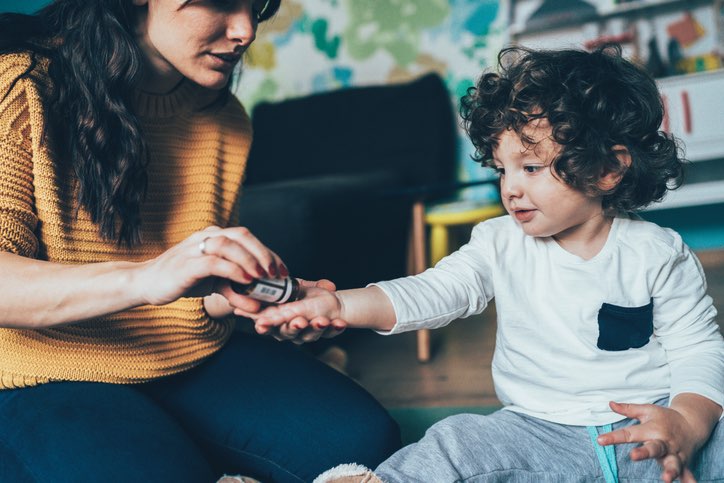What Are My Options to Treat ADHD Without Medication?

As the parent of a child with mixed-presentation ADHD, I understand the battle between deciding to medicate or not medicate your child. I wasn’t keen to jump on the medication bandwagon. Still, as someone with a lot of experience teaching kids with ADHD and alternative therapies, I understood that medication like Aderall or Ritalin is often a helpful aid.
However, while stimulant medications can help children with ADHD, but some kids experience side effects. If you’re searching for nondrug options for treating ADHD, factors like nutrition, exercise, and behavioral therapy can all be helpful tools.
Related: Can Behavioral Therapies Help with ADHD?
What is ADHD?
ADHD, or attention deficit hyperactivity disorder, is a condition that affects a person’s brain function and ability to pay attention, sit still, and control impulsive behaviors. Boys are more likely than girls to have ADHD, and it is usually diagnosed in elementary school. However, children, teens, and adults can all be affected by ADHD.
Many people who were children in the 80s and early 90s were diagnosed with adult ADHD because there wasn’t a thorough understanding of how to treat ADHD or effective interventions.
Signs and Symptoms of ADHD
- Makes careless mistakes
- Inattention to details
- Has difficulty paying attention to tasks or while playing
- Seems not to listen when directly spoken to
- Fails to follow through on instructions, schoolwork,
- or chores
- Has difficulty organizing tasks and activities
- Avoids, dislikes, or is reluctant to participate in tasks
- requiring sustained mental effort
- Loses things
- Easily distracted
- Forgetful in daily activities
This fact sheet from the CDC is a helpful resource for parents.
Potential Side Effects of ADHD Medication for Kids

According to Child Mind Institute, some children taking stimulant medication for attention and hyperactivity disorders (ADHD) may experience troubling side effects such as decreased appetite, weight loss, insomnia, personality changes, and delayed growth. While often times these side effects can be resolved by adjusting the dose of medication, some families may wish to seek alternative, non-stimulant treatment options for ADHD.
Since 2006, the Food and Drug Administration has required that stimulants used in the treatment of ADHD (including Adderall, Ritalin, and Concerta) carry warnings of the risk for sudden death, heart attacks, and hallucinations in some patients. It's not surprising, then, that as many as two-thirds of children diagnosed with ADHD have been given some form of alternative treatment.
Unfortunately, it took us a few years and three medications before we found the right fit for my son. But fortunately, my son hasn’t experienced any unpleasant side effects from his medications other than slight appetite suppression in the middle of the day.
An ADHD diagnosis is worrisome for some parents. Still, for others, like myself, it means their child can finally begin receiving treatment that correlates with their condition and can lead to positive lifestyle changes.
Seeking Alternatives to Prescription Drugs
Some doctors will advise parents that scientific research has not yet substantiated the value of alternative treatments for ADHD and will term reports of their efficacy "purely anecdotal." However, remember that the lack of scientific validation for treatment doesn't necessarily mean that the treatment doesn't work; the studies simply may not have been performed.
Parents who wish to pursue a holistic approach to ADHD treatment can find a pediatrician willing to try alternatives; check out the site Integrative Pediatrics. Remember that every child is an individual with a unique body chemistry and physiology: Be prepared to spend some time (and money) trying the different approaches to find ones that help.
And if you need a second opinion when you think you see improvement in your child, remember that your child's teacher may be your most objective judge. Following are some non-drug options.
Diet Changes

There is limited evidence that changing a child’s diet could work as a natural treatment. A balanced diet is essential to any child’s health; however, the research that exists indicates that protein-rich foods, complex carbohydrates, Omega-3 fatty acids, and vitamins and minerals like iron, magnesium, zinc, vitamin b-6, and vitamin D are beneficial.
Protein plays a crucial role in creating neurotransmitters and supporting a healthy brain.
Complex carbohydrates can help prevent blood sugar spikes and fills you up longer, preventing mindless snacking.
Omega-3 fatty acids are essential for heart and brain health.
Parents should avoid added sugars, simple carbohydrates, caffeine, and artificial additives. In a 2007 study published in The Lancet, researchers from the University of Southampton in the U.K. found that artificial coloring and preservatives can cause an increase in hyperactive behaviors.
Unknown food sensitivities or allergies may also play a role. For example, research has shown removing gluten, soy, and wheat from an ADHD child’s diet reduces impulsivity and hyperactivity.
An elimination diet is the best way to monitor the effects of diet changes. Eliminate only one food or food additive at a time, and monitor the child's behavior closely when you reintroduce it after a period of time has elapsed.
Exercise

We all know that exercise is essential to a person’s mental health. Therefore an increase in physical activity increases serotonin which helps a child pay attention. Aerobic activities like walking, running, swimming, and biking are great choices.
Complex exercises like martial arts, dance, gymnastics, and yoga challenge the mind and the body and work on self-control, balance, memory, concentration, and fine motor skills.
Behavioral Therapy

Cognitive behavioral therapy or CBT works to help a child focus on their positive attributes and teaches them how to have control over their behaviors. Effective CBT provides positive neurofeedback.
Steps of CBT Include:
- Identifying things that are upsetting you
- Becoming aware of your thoughts and feelings about these things
- Recognize thinking that is negative versus accurate
- Reshaping negative thoughts into a more positive view
CBT works for individuals with ADHD, anxiety, OCD, depression, eating disorders, and bipolar disorders and is most effective with older kids and adolescents.CBT can boost a person’s self-esteem and executive functioning and is often a valuable part of a child’s treatment plan.
Psychoeducation

Psychoeducation means educating the individual and those in their life about ADHD. Pyschoeducation involves discussing treatment options, including natural remedies, potential lifestyle changes like additional exercise and a healthy diet, and possibly using supplements or meds. Psychoeducation involves the patient, their parents and family, and their educators.
Supplements

There is limited evidence that supplements like melatonin, zinc, magnesium, and omega-3 fatty acids may be complementary aid to your child’s medication or alternative treatments. Before giving your child, any supplements, discuss options with your child’s pediatrician.
—
For more information, you might also want to go to the Children and Adults with Attention Deficit Disorders (CHADD) website at http://www.chadd.org. You can also find out about local support groups for parents who have children with ADHD.

